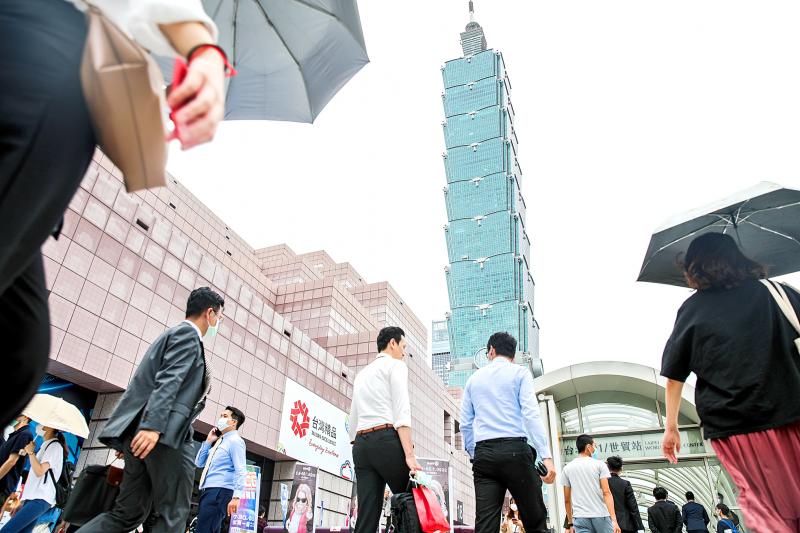The Taipei 101 Observatory could see its visitor numbers tumble to a record low this year, as border controls have reduced foreign tourist arrivals, its main supply of customers.
The number of visits might drop below 500,000 this year, less than 25 percent of the 2 million visits reported last year, said Angela Chang (張振亞), president of Taipei Financial Center Corp (TFCC, 台北金融大樓), which operates the skyscraper.
Prior to the COVID-19 pandemic, foreign tourists contributed 80 percent of visits to the observatory, dubbed the nation’s hottest tourist spot.

Photo: Bloomberg
Like tourist hotels in Taipei, the observatory has shifted its focus to domestic visitors and the strategy, coupled with reduced admission fees, resulted in there being 220,000 visits during the June-to-August period, Chang said.
Taiwanese now make up 99 percent of its visitors, she said.
The observatory is seeking to bolster business by extending its discounts through this year, with tickets costing NT$300 per adult and NT$190 per senior citizen, Chang said, adding that adult visitors may take two children under the age of 12 with them free of charge.
The arrangement is intended to attract families, she said, after a promotion campaign that lowered admission fees to NT$150 per person expired yesterday.
Domestic visitors might not completely fill the void left by foreign tourists, Taiwan Ratings Corp (中華信評) said earlier, after downgrading the credit outlook for TFCC from “stable” to “negative.”
The ratings agency said that international travel would remain muted as the number of COVID-19 infections is still on the rise worldwide.
Border controls would reduce the number of visitors to the observatory and its observation deck, denting its revenue by up to 80 percent this year, the ratings agency said.
Visitors to the observatory rose to a record high of 2.8 million in 2015, but dropped by 10 percent in each of the following years due to chilling cross-strait ties.
Chinese tourists used to make up the biggest chunk of visitors, followed by tourists from Japan and South Korea, Chang said.

CAUTIOUS RECOVERY: While the manufacturing sector returned to growth amid the US-China trade truce, firms remain wary as uncertainty clouds the outlook, the CIER said The local manufacturing sector returned to expansion last month, as the official purchasing managers’ index (PMI) rose 2.1 points to 51.0, driven by a temporary easing in US-China trade tensions, the Chung-Hua Institution for Economic Research (CIER, 中華經濟研究院) said yesterday. The PMI gauges the health of the manufacturing industry, with readings above 50 indicating expansion and those below 50 signaling contraction. “Firms are not as pessimistic as they were in April, but they remain far from optimistic,” CIER president Lien Hsien-ming (連賢明) said at a news conference. The full impact of US tariff decisions is unlikely to become clear until later this month

GROWING CONCERN: Some senior Trump administration officials opposed the UAE expansion over fears that another TSMC project could jeopardize its US investment Taiwan Semiconductor Manufacturing Co (TSMC, 台積電) is evaluating building an advanced production facility in the United Arab Emirates (UAE) and has discussed the possibility with officials in US President Donald Trump’s administration, people familiar with the matter said, in a potentially major bet on the Middle East that would only come to fruition with Washington’s approval. The company has had multiple meetings in the past few months with US Special Envoy to the Middle East Steve Witkoff and officials from MGX, an influential investment vehicle overseen by the UAE president’s brother, the people said. The conversations are a continuation of talks that

CHIP DUTIES: TSMC said it voiced its concerns to Washington about tariffs, telling the US commerce department that it wants ‘fair treatment’ to protect its competitiveness Taiwan Semiconductor Manufacturing Co (TSMC, 台積電) yesterday reiterated robust business prospects for this year as strong artificial intelligence (AI) chip demand from Nvidia Corp and other customers would absorb the impacts of US tariffs. “The impact of tariffs would be indirect, as the custom tax is the importers’ responsibility, not the exporters,” TSMC chairman and chief executive officer C.C. Wei (魏哲家) said at the chipmaker’s annual shareholders’ meeting in Hsinchu City. TSMC’s business could be affected if people become reluctant to buy electronics due to inflated prices, Wei said. In addition, the chipmaker has voiced its concern to the US Department of Commerce

STILL LOADED: Last year’s richest person, Quanta Computer Inc chairman Barry Lam, dropped to second place despite an 8 percent increase in his wealth to US$12.6 billion Staff writer, with CNA Daniel Tsai (蔡明忠) and Richard Tsai (蔡明興), the brothers who run Fubon Group (富邦集團), topped the Forbes list of Taiwan’s 50 richest people this year, released on Wednesday in New York. The magazine said that a stronger New Taiwan dollar pushed the combined wealth of Taiwan’s 50 richest people up 13 percent, from US$174 billion to US$197 billion, with 36 of the people on the list seeing their wealth increase. That came as Taiwan’s economy grew 4.6 percent last year, its fastest pace in three years, driven by the strong performance of the semiconductor industry, the magazine said. The Tsai